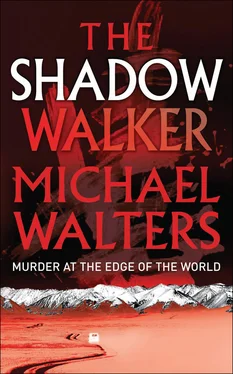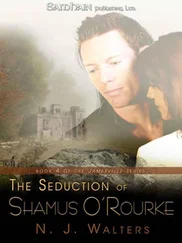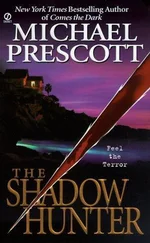Michael Walters - The Shadow Walker
Здесь есть возможность читать онлайн «Michael Walters - The Shadow Walker» весь текст электронной книги совершенно бесплатно (целиком полную версию без сокращений). В некоторых случаях можно слушать аудио, скачать через торрент в формате fb2 и присутствует краткое содержание. Жанр: Полицейский детектив, на английском языке. Описание произведения, (предисловие) а так же отзывы посетителей доступны на портале библиотеки ЛибКат.
- Название:The Shadow Walker
- Автор:
- Жанр:
- Год:неизвестен
- ISBN:нет данных
- Рейтинг книги:3 / 5. Голосов: 1
-
Избранное:Добавить в избранное
- Отзывы:
-
Ваша оценка:
- 60
- 1
- 2
- 3
- 4
- 5
The Shadow Walker: краткое содержание, описание и аннотация
Предлагаем к чтению аннотацию, описание, краткое содержание или предисловие (зависит от того, что написал сам автор книги «The Shadow Walker»). Если вы не нашли необходимую информацию о книге — напишите в комментариях, мы постараемся отыскать её.
The Shadow Walker — читать онлайн бесплатно полную книгу (весь текст) целиком
Ниже представлен текст книги, разбитый по страницам. Система сохранения места последней прочитанной страницы, позволяет с удобством читать онлайн бесплатно книгу «The Shadow Walker», без необходимости каждый раз заново искать на чём Вы остановились. Поставьте закладку, и сможете в любой момент перейти на страницу, на которой закончили чтение.
Интервал:
Закладка:
Unexpectedly-to Drew at least-the flight was interrupted for refueling at Irkutsk, on the far eastern Russian border. The flight circled in over the vast white expanse of Lake Baikal, the dark Siberian forests stretched out ahead. There was more queuing to display passports and visas, the wooden-faced official peering suspiciously at Drew’s documents.
“Police?” he had said finally, in heavily accented English.
Drew nodded, drawing a deep breath to launch into some kind of explanation. He had in his pocket the formal letter of invitation from the Mongolian government, though he had no idea how much weight this would carry this side of the border. But, after a lengthy pause, the man had just nodded and smiled faintly. “Good luck,” he said. Drew suspected that he had used the only English words he knew.
Drew and the other passengers had sat in the empty airport, surrounded by cheap pine veneer and grimy plate glass windows, drinking strong coffee from the primitive bar. At one point, seeking air, Drew had wandered out to join the cluster of smokers on a small wooden balcony, with views out over the woodlands and lake. Although it was midafternoon, it was icy cold, the Russian winter already biting. He stood for as long as he could, the frozen air harsh in his lungs, looking out at the dense Siberian forests, the trees black against the pure blue of the sky, the landscape deathly silent. He had felt then as if he was standing at the edge of the world, with no inkling of what might lie beyond.
Minutes later, they were shepherded back on to the plane. As they walked back out across the tarmac, Drew looked around at his fellow travelers. Most were Mongolian, with the distinctive broad features and dark skin, though there was a scattering of Westerners and some who looked, to Drew’s undiscerning eye, to be Chinese. Most were dressed in conventional Western clothes-suits, jeans, sweatshirts-but two older men were dressed in heavy, dark colored robes, wrapped around with brilliantly patterned golden sashes.
Later, as they approached Ulan Baatar, the plane banked low over the steppes, turning in sharply toward the airport. The sun was low in the clear sky, casting deep shadows across the endless green plains. Even the shape of the hills was different here-softer, rounder, distinctively Asian. As the plane descended, Drew glimpsed, startlingly close to the runway, scatterings of nomadic camps, round gray tents, figures wrapped in traditional robes, tethered horses, flocks of sheep and herds of horned cattle.
The sight was unexpected, but this was how the people lived here. The population was sparse-little more than one person per square kilometer of land-and half still lived in the traditional ger tents. Half of those remained nomadic, tending their herds, moving with the seasons, coping with the extremes of an intense continental climate. It was a basic lifestyle unchanged for a thousand years. And over the past decade, unemployment and poverty had driven increasing numbers back out to the steppes, struggling to eke out an existence from the inhospitable grassland, rediscovering traditional ways of living, the lure and challenges of the endless plains.
Minutes later, the plane landed and, as incongruous as if from another age, there were the strings of landing lights, the formalities of passport and customs, the baggage carousel that, to Drew’s mild surprise, rapidly disgorged the luggage he had checked in hours before. All around, there was the anonymous glare and bustle of a shabby airport terminal that might have been anywhere in the world.
“Drew,” Nergui said. “Drew McLeish. That is a Scottish name, yes?”
Drew looked across at the heavily built figure beside him. “My father was from Glasgow. But my family moved to Manchester when I was a boy, so I lost the accent long ago. You know the UK?”
Nergui nodded. “I spent a year there. Studying.”
“Your English is excellent.”
“Thank you. I also spent some years in the US, so I talk about sidewalks and elevators.” Nergui laughed. “But I liked England. A beautiful country.”
“We have our own ugliness and pollution,” Drew said. “But some of it is beautiful.”
“We will show you some of the attractions of our country while you are here.” Nergui paused. “It is good of you to come. We will need all the help and advice you can give us. You will find us very amateurish, I am afraid.”
This seemed unlikely. The police might be short of resources and experience, but it was clear, even from their brief initial contact with Drew, that Nergui and Doripalam were anything but amateurs. “I don’t know that there’s much I’ll be able to teach you,” he said. “But I’ll give whatever help and support I can.”
“This kind of crime is new to us, Chief Inspector. Drew.” He said the name as though trying it out, but seemed satisfied with the effect.
Drew shrugged. “Thankfully,” he said, “none of us comes across this kind of crime very often.”
That was true enough. Crime wasn’t supposed to be like this, not here. Crime here could be violent and sometimes complex-which was when Nergui tended to get involved these days-but mostly it was trivial stuff. Nergui had read in the newspaper only a few days before that the single most common crime in Mongolia was the theft of cattle. A few months earlier, an English journalist had had his bicycle stolen by a man on a horse, though Nergui had no idea how this could have been done. And there was always the drunkenness, worse when the nights lengthened and the weather became cold, and worst of all among the growing numbers without jobs or prospects. The levels of alcoholism and drug abuse in the capital mounted with every passing month.
But, even in these dark times, crime was not like this.
When they found the first body, nobody was surprised. These things happened from time to time. They had always happened, even in the old days, though then the authorities had made sure they were never reported. In these more liberal times, the privately owned scandal sheets picked up on stories like this and tried to stir up some trouble. But such incidents were usually soon forgotten, either because the police knew immediately who was responsible or because they were never likely to find out.
The body had been found in one of the narrow unlit side streets near the city center, in the shadow of a long-abandoned clothing factory. Cocooned in his new role, Nergui had had no reason to be involved. But he felt some frustration that this potentially interesting case had arisen so soon after his detachment to the Ministry. Bored and curious, he had used his newfound authority to request a copy of the scene-of-crime report. To his surprise, it arrived promptly and without question. One of the minor privileges available to those who no longer had to deal with policing on the front line.
Not for the first time, reading through the turgid account, Nergui wished that the police were able to demand a higher standard of literacy from their front line officers. But the basic narrative was clear enough. A local drunk had found the body, while making his way home in the small hours after a night spent gambling in some illegal bar.
Nergui had seen more than enough dead bodies in his career. He could only hope that, when the drunk realized what lay beside him, alcohol had lessened the shock. But he suspected not, given the copious amounts of vomit apparently spread across the body when the police arrived. The pathologist, faced with an already unpleasant task, had expressed outrage at this further disruption of the evidence. On the other hand, as Nergui glanced through the crime scene photographs he had to admit that, even for a sober person, vomiting would have been an understandable response.
The body was severely mutilated; it had been decapitated and was missing its hands, the neck and wrists savagely chopped as though with a heavy blunt blade. There were multiple lacerations to the chest as if the killer had been unable to stop, slashing savagely at the body, tearing repeatedly through its thin clothing, long after life must have departed. There was no sign of the missing body parts.
Читать дальшеИнтервал:
Закладка:
Похожие книги на «The Shadow Walker»
Представляем Вашему вниманию похожие книги на «The Shadow Walker» списком для выбора. Мы отобрали схожую по названию и смыслу литературу в надежде предоставить читателям больше вариантов отыскать новые, интересные, ещё непрочитанные произведения.
Обсуждение, отзывы о книге «The Shadow Walker» и просто собственные мнения читателей. Оставьте ваши комментарии, напишите, что Вы думаете о произведении, его смысле или главных героях. Укажите что конкретно понравилось, а что нет, и почему Вы так считаете.












